
-How To Choose A Book
-Themed Book Lists
-Canadian Children’s Book Awards
-Links
-Teacher’s Book Bank
- Subject:
- English Language Arts
- Material Type:
- Primary Source
- Reading
- Author:
- Canadian Children's Book Centre
- Date Added:
- 12/07/2018
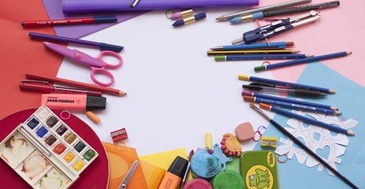
This is a collection of resources focussed on early learning for pre-school and kindergarten students.

-How To Choose A Book
-Themed Book Lists
-Canadian Children’s Book Awards
-Links
-Teacher’s Book Bank
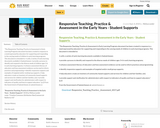
"The Responsive Teaching, Practice & Assessment in Early Learning Programs document has been created in response to a need expressed by educators for supporting and responding to the varying needs of children in early learning programs. This document is intended to:
• unify a variety of early learning documents available in Saskatchewan;
• provide a process to identify and respond to the diverse needs of children ages 3-6 in early learning programs;
• enhance assessment literacy of educators and how assessment evidence can be used to inform practices and programming;
• identify responsive supports and examples of targeted and/or small group supports;
• help educators create an inventory of community-based supports and services for children and heir families; and,
• provide support and clarification for administrators with respect to indicators of quality and how to support educators." (p.2)
From the Government of Saskatchewan at saskatchewan.ca
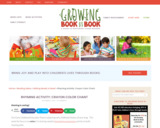
This playful phonological awareness activity to build rhyming skills using colors. Lots of fun for preschoolers and early readers!
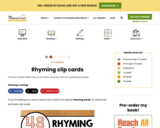
If you’re looking for a way to teach your student/child to recognize rhyming words, try these free printable clip cards!
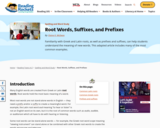
Familiarity with Greek and Latin roots, as well as prefixes and suffixes, can help students understand the meaning of new words. This article includes many of the most common examples.
Included in the article are downloads of Common Latin Roots chart, Common Greek Roots chart, Common Prefixes chart, Common Suffixes chart.
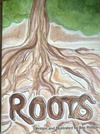
Based on the book Roots by Brie Philips, Sun West School Division created this bundle of resources to help guide the infusion of Indigenous perspectives into early years classrooms. The Roots bundle encourages students to learn about the land they are on and form personal connections to the natural world around them through literacy, exploration, and play.
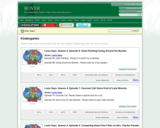
Check out these great video/curricular resources for Kindergarten. The ROVER videos all indicate the curriculum outcomes that they address.
ROVER (Recommended Online Video Education Resources) is a video streaming service for Saskatchewan teachers and students in the PreK-12 education system. It is managed and maintained by the Saskatchewan Ministry of Education. ROVER is a video-on-demand service that provides teachers and students with the convenience of immediate access to streamed, educational videos that support curricula.
This site also offers all of the curriculum documents for all grade levels.
If you are unable to access the site, it may be because a Saskatchewan Ministry of Education Blackboard login is required. All students have an Edonline account, so contact your child's school or the Ministry of Education’s Support Desk at 1-866-933-8333 or email at stans@gov.sk.ca for login information. Your child's student number will be required.
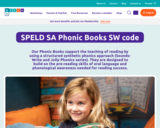
This is an excellent resource within the classroom or to share with parents for effective at-home learning!
Each book can be used online in an HTML version OR downloaded as a free PDF that can be printed as an actual book. There is a PowerPoint for each book. This resource includes various formats , including special versions for ipads or tablets.
Worksheets and fluency charts accompany each book! There are ten total sets of readers with many books included in each set.
SPELD SA Phonic Books follow the sequence of letter-sounds used in the Jolly Phonics phonics program. The books can be used with other phonics programs as well.
Sequence of letter-sounds:
- Set 1 - s, a, t, p, i, n
- Set 2 - c, k, ck, e, h, r, m, d
- Set 3 - g, o, u, l, f, b
- Set 4 - ai, j, oa, ie, ee, or
- Set 5- z, w, ng, v, oo (book), oo (room)
- Set 6 - y, x, sh, ch, th (think), th (that)
- Set 7 - qu, ou, oi, ue, er, ar
- Set 8 - y (sunny), a (apron), a-e (cake), e (female), e-e (eve), i (silent), i-e (kite), o (open), o-e (home), u (student), u-e (tune)
- Set 9 - ay (play), ey (they), oy (toy), y (mystery), ea (dream), ie (chief), y (dry), igh (night)
- Set 10 - oe (toe), ow (rainbow), ow (now), ir (bird), ur (turn), ew (few), au (launch), aw (paw), al (talk)
To access more free online decodable books, visit https://literacylearn.com/free-decodable-readers/
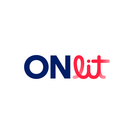
This document shows a sample schedule for a language block in grade 1 or 2.
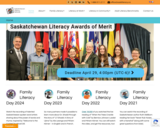
e Saskatchewan Literacy Network is Saskatchewan's leader in literacy and essential skills. Our organization engages with government departments, academic institutions, literacy organizations, private companies, literacy practitioners, communities, and learners throughout the province.
Resources are available for adult learners, families and teachers!

The Ministry of Education continues to work with its human service partners to implement the plan by focusing on alignment and coordination of services across the early years sector. These actions are improving service responses for children and families, and supporting child development and school readiness outcomes.

Start your day with the Science of Reading! The free, downloadable Scarborough’s Reading Rope placemat is the perfect addition to your classroom table or desk.
Designed for educators who are passionate about research-based literacy practices, this placemat breaks Scarborough’s Reading Rope down into the key elements of skilled reading and includes quick teaching tips for integrating each into your instruction.

SciShow produces informational science videos for students of any age. They do have the look and feel that would likely appeal to younger students.
These videos are hosted by Jessi and her robot rat “Squeaks” and answer questions that inquiring young minds really want to know.
A variety of topics are covered in videos including: science on the playground, getting to know your emotions, simple machines, experiments, animal information, brainteasers and more.
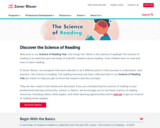
Get to know the science of reading.

This collection houses resources that support teachers in implementing research and evidence-based practices in the instruction of reading. This collection is being added to and developed and is a "work in progress!" Please continue to check back as we add more resources and links!

"The science of reading has culminated in a preponderance of evidence to inform how proficient reading and writing develop; why some have difficulty; and how we can most effectively assess and teach and, therefore, improve student outcomes through prevention of and intervention for reading difficulties.
Although the scientific evidence base for effective reading has existed for decades, the term “the science of reading” has gained traction in the last few years, potentially leading to misunderstandings. The Science of Reading: Defining Guide provides a firm definition of what the science of reading is, what it is not, and how all stakeholders can understand its potential to transform reading instruction."
You can register to get a free download of the e-book, or purchase a copy on this site.
39 pages; easy/light read.
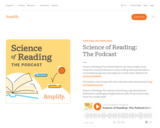
By Amplify Education. A podcast that dives into different elements of the Science of Reading.

Susan Lambert is joined by Dr. Brittney Bills, educator and recent Science of Reading Star Award Winner to discuss MTSS. Dr. Bills began her journey as a school psychologist for six years before transitioning to the role of curriculum coordinator at Grand Island Public Schools. In this episode, Dr. Bills explains what MTSS is and how it centers on prevention rather than intervention. She talks about the intersection of universal screening data and MTSS and provides advice on evidence-based strategies and techniques to make a positive impact in your classroom. Using examples from her own district, Dr. Bills discusses avoiding burnout, learning to use data, and the process of ongoing improvement.

Check out this one-hour-long presentation for an overview of the Science of Reading. This was done for a virtual conference and is a great introduction to this important topic. Click on the image below to watch the video.

Really Great Reading offers free webinars to educators to learn about how to teach reading and vocabulary.